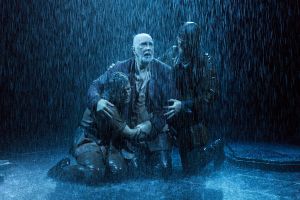
Photo Credit: AP—Frank Langella as King Lear
Gloucester
Oh, let me kiss his hand!
Lear
Let me wipe it first. It smells of mortality.
We are at the mercy of the elements. They are raging all around us. For some they are raging right where they are.
It is not so much that the elements are out of control as that we are not in control.
The stormy heath reflected the storm in King Lear’s soul. This is my stormy heath: Hurricanes. Floods. Wildfires. Earthquakes.
It reflects the storm that has been raging in my soul for lo these past few months. I woke in despair pretty much every day. Woke being a relative term since my sleep was something less than—well sleep. Night and day merged into one endless unsettling dream state.
And then, rather suddenly over these past two weeks, a calm came over me. I slept. And then I woke. And then I went about my daily life.
I became the eye of the hurricane.
I started each morning writing in my journal. I wrote two blog posts, which meant I had something to say again. Or perhaps more, that I could articulate what was swirling in my head and heart.
A darkness descended on the world with the election and inauguration of Donald Trump. I’m not going to apologize for that statement or even qualify it as an opinion. I think one can observe the world and see it is just the truth.
Religious opinion trumps (you will pardon the expression) science. Mansplaining is getting institutionalized in law. Women are told to shut up and know their place (she was warned, yet she persisted). The very narrow world of white, male privilege is being venerated (Charlottesville, repeal of DACA, Joe Arpaio).
I think these fools thought they could build an impenetrable wall around a very small universe that once was. The Jim Crow, father-knows-best, you’re-such-a-pretty-girl-why-can’t-you-make-a-good-cup-of-coffee, god-hates-anyone-who-isn’t-like-me, climate-change-is-a-hoax universe. A wall that would keep life out.
And then came the hurricanes, the floods, the wildfires, the earthquake. Not to mention nuclear weapons in the hands of two infants in men’s bodies.
I learned about the philosophy of the microcosm and macrocosm from my high school English teacher Ed Brush—aka, Mr. Shakespeare. And that’s what I thought of when the chaos and destruction began.
The microcosm is the world of the mortal. We live in our own microcosm as well as a collective one. The collective one right now is particularly micro because the “leader” of the free world has, as Bill Moyers says, an open sore in place of a soul. He has no respect or compassion for mortality.
The macrocosm is the land of the immortal. That which will continue with or without us. It encompasses life and death and ambiguity. Earth is steady and has earthquakes. Wind is gentle, and it wrecks havoc. And, in its absence, keeps sailing ships in the doldrums. Fire warms us and consumes us. Water sustains us and overwhelms us.
We are rarely in control. Not being in control is the essence what it is to be mortal, to live in a microcosm.
Feeling that lack of control is what brought me to a place of calm. Not the calm of the doldrums, but the calm of the eye of the hurricane. Mortality gives us definition. We have a beginning and an end parenthesis.
Faulkner said that writers should banish fear, the fear of being blown up by nuclear weapons, from their workshop, for only then can we write about the human heart in conflict with itself—only that is worth writing about. I learned that from Bert Fraser, another high school English teacher.
It feels good to not be afraid. It feels good not being in control. It feels good to ride out my own life, my private microcosm, to have faith that my life matters regardless of where the parenthesis ends.
To know that being human is to have a heart in conflict with itself is to have compassion for what it means to be human—to embrace our microcosm as part of the gigantic macrocosm that existed long, long before we did, and will go on for a long, long time, with or without us.

 There are two sides to the story, “they” say. But really, there’s simply the story, driven by yearnings challenged and yearnings thwarted.
There are two sides to the story, “they” say. But really, there’s simply the story, driven by yearnings challenged and yearnings thwarted.